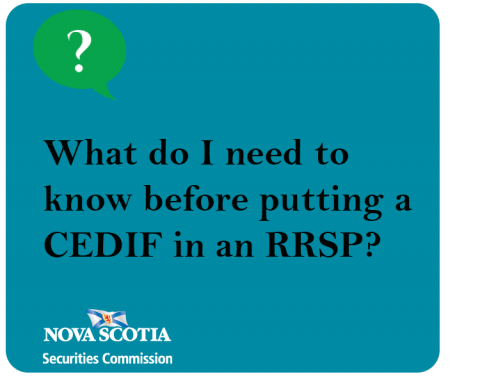Submitted by nsscadmin on

When you’re investing in a CEDIF you’re investing in a new and or small business. Investing in any small or new business has substantial risks. There are separate risks that come with investing in a CEDIF and placing that investment in an RRSP.
Investors should not depend on selling their CEDIF shares or income from their CEDIF shares to fund their retirement when investing through a RRSP. If you are thinking about investing in a CEDIF through an RRSP, consult with a tax professional and an investment adviser so you know the risks, rules and regulations that apply.
Although investing in a CEDIF through a self-directed RRSP may yield a tax deferral today, you may have long-term tax and liquidity issues. As we said in last week’s post on getting out of a CEDIF investment, there is no organized market through which CEDIF shares may be sold. It may be difficult or even impossible for the investor to sell them or determine their fair market value.
When investors reach the age of 71 they will be required to start withdrawing funds or investments in-kind from their RRSP/RRIF. Investors may be required to report the value of the CEDIF shares as income even though the shares have not been sold. For example, say you paid $5,000 for your CEDIF shares and deposited the shares or invested through an RRSP. When you reach the age of 71 you may be required to withdraw a minimum amount. You may not be able to sell your CEDIF shares but may be required to withdraw the investment in-kind. You will still be required to report as income the fair market value of your CEDIF shares, which may be the original cost of $5,000, even though you did not physically sell them and you will effectively still own the CEDIF shares.
Some institutions may not accept your CEDIF shares when converting your RRSP into a RRIF. Therefore, you may be required to withdraw the shares in-kind and report their value as income without actually selling the shares.
The NSSC does not provide tax guidance or advice. You should consult with a tax professional regarding the taxation relating to investments in CEDIFs.
